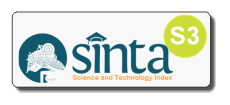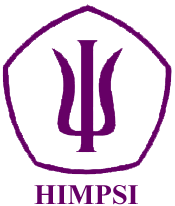Growth Mindset and Self-Regulated Learning in College Students
Abstract
Full Text:
PDFReferences
Arifin, M., Dardiri, A., & Handayani, A. N. (2016). Hubungan Kemampuan Penyesuaian Diri dan Pola Berpikir dengan Kemandirian Belajar serta Dampaknya pada Prestasi Akademik Mahasiswa. Jurnal Pendidikan: Teori, Penelitian, dan Pengembangan, 1(10), 1943–1951. https://doi.org/10.17977/jp.v1i10.7105
Bosman, L. (2019). From Doing to Thinking: Developing the Entrepreneurial Mindset through Scaffold Assignments and Self-Regulated Learning Reflection. Open Education Studies, 1(1), 106–121. https://doi.org/10.1515/edu-2019-0007
Budiman, D., & Gwee, J. (2012). Setiap Orang Sales Harus Punya Mindset dan Attitude Juara Ini! Jakarta: PT Gramedia Pustaka Utama.
Dweck, C. S. (2007). Cara Baru Melihat Dunia dan Hidup Sukses Tak Terhingga (Ruslani, Trans.). Jakarta: Penerbit Serambi. (Original work published 2006)
Etiafani, & Listiara, A. (2015). Self-Regulated Learning dan Kecemasan Akademik pada Siswa SMK. Jurnal EMPATI, 4(4), 144–149. https://doi.org/10.14710/empati.2015.13674
Fasikhah, S. S., & Fatimah, S. (2013). Self-Regulated Learning (SRL) dalam Meningkatkan Prestasi Akademik pada Mahasiswa. Jurnal Ilmiah Psikologi Terapan, 1(1), 145–155. https://doi.org/10.22219/jipt.v1i1.1364
Go, F., & Subagio, H. (2014). Mengakhiri Era Tenaga Kerja Murah. Jakarta: PT Gramedia Pustaka Utama.
Hidayah, N., & Atmoko, A. (2014). Landasan Sosial Budaya dan Psikologis Pendidikan: Terapannya di Kelas. Malang: Penerbit Gunung Samudera.
Jahja, Y. (2011). Psikologi Perkembangan. Jakarta: Kencana.
Lyons, P., & Bandura, R. (2018). The Intersection of Mindsets and Self-Regulated Learning. Development and Learning in Organizations: An International Journal, 32(2), 1–4. https://doi.org/10.1108/DLO-01-2017-0001
Mangels, J. A., Butterfield, B., Lamb, J., Good, C., & Dweck, C. S. (2006). Why Do Beliefs About Intelligence Influence Learning Success? A Social Cognitive Neuroscience Model. Social Cognitive and Affective Neuroscience, 1(2), 75. https://doi.org/10.1093/scan/nsl013
Montalvo, F. T., & Torres, M. C. G. (2004). Self-Regulated Learning: Current and Future Directions. Electronic Journal of Research in Educational Psychology, 2(1), 1-34.
Najah, A. (2012). Self-Regulated Learning Mahasiswi Ditinjau dari Status Pernikahan. Educational Psychology Journal, 1(1). https://journal.unnes.ac.id/sju/index.php/epj/article/view/2649
Nasrullah, R. (2016). Teori dan Riset Media Siber (Cybermedia). Jakarta: Kencana.
Priskila, V., & Savira, S. I. (2019). Hubungan antara Self-Regulated Learning dengan Stres Akademik pada Siswa Kelas XI SMA Negeri X Tulungagung dengan Sistem Full Day School. Character: Jurnal Penelitian Psikologi, 6(3). https://jurnalmahasiswa.unesa.ac.id/index.php/40/article/view/29131
Seli, H., & Dembo, M. H. (2016). Motivation and Learning Strategies for College Success: A Focus on Self-Regulated Learning. New York, NY: Routledge.
Simaremare, A. P. R. (2019). Self-Regulated Learning in Correlation to Learning Outcome of Computer-Based Test Preparation of Medical Students. Jurnal Pendidikan Kedokteran Indonesia - The Indonesian Journal of Medical Education, 8(3), 136–143. https://doi.org/10.22146/jpki.45505
Soetjiningsih, C. H. (2018). Seri Psikologi Perkembangan: Perkembangan Anak Sejak Pembuahan sampai dengan Kanak-Kanak Akhir. Jakarta: Kencana.
Ulum, M. I. (2016). Strategi Self-Regulated Learning untuk Menurunkan Tingkat Prokrastinasi Akademik Siswa. Psympathic: Jurnal Ilmiah Psikologi, 3(2), 153–170. https://doi.org/10.15575/psy.v3i2.1107
Wati, S. & Firman. (2018). Hubungan Self-Regulated Learning dengan Flow Akademik Siswa. Jurnal Neo Konseling, 00(00), 1–6.
Widodo, S. (2011). Mindset Sukses Agen Asuransi: Cara Cerdas Sukses, Kaya, dan Terpuji. Jakarta: PT Gramedia Pustaka Utama.
Yan, V. X., Thai, K.-P., & Bjork, R. A. (2014). Habits and Beliefs That Guide Self-Regulated Learning: Do They Vary With Mindset? Journal of Applied Research in Memory and Cognition, 3(3), 140–152. https://doi.org/10.1016/j.jarmac.2014.04.003
Yunus S. B., M. (2014). Mindset Revolution: Optimalisasi Potensi Otak Tanpa Batas. Yogyakarta: Jogja Bangkit Publisher.
Yuzarion. (2017). Faktor yang Mempengaruhi Prestasi Belajar Peserta Didik. Ilmu Pendidikan: Jurnal Kajian Teori Dan Praktik Kependidikan, 2(1), 107–117. https://doi.org/10.17977/um027v2i12017p107
Zimmerman, B. J. (1989). A Social Cognitive View of Self-Regulated Academic Learning. Journal of Educational Psychology, 81(3), 329–339. https://doi.org/10.1037/0022-0663.81.3.329
DOI: http://dx.doi.org/10.17977/um023v12i12023p1-9
Refbacks
- There are currently no refbacks.
Copyright (c) 2023 Jurnal Sains Psikologi

This work is licensed under a Creative Commons Attribution 4.0 International License.
Reference Manager :
|
Aliansi:
Plagiarism Checker :
This work is licensed under a Creative Commons Attribution 4.0 International License.




1.png)








